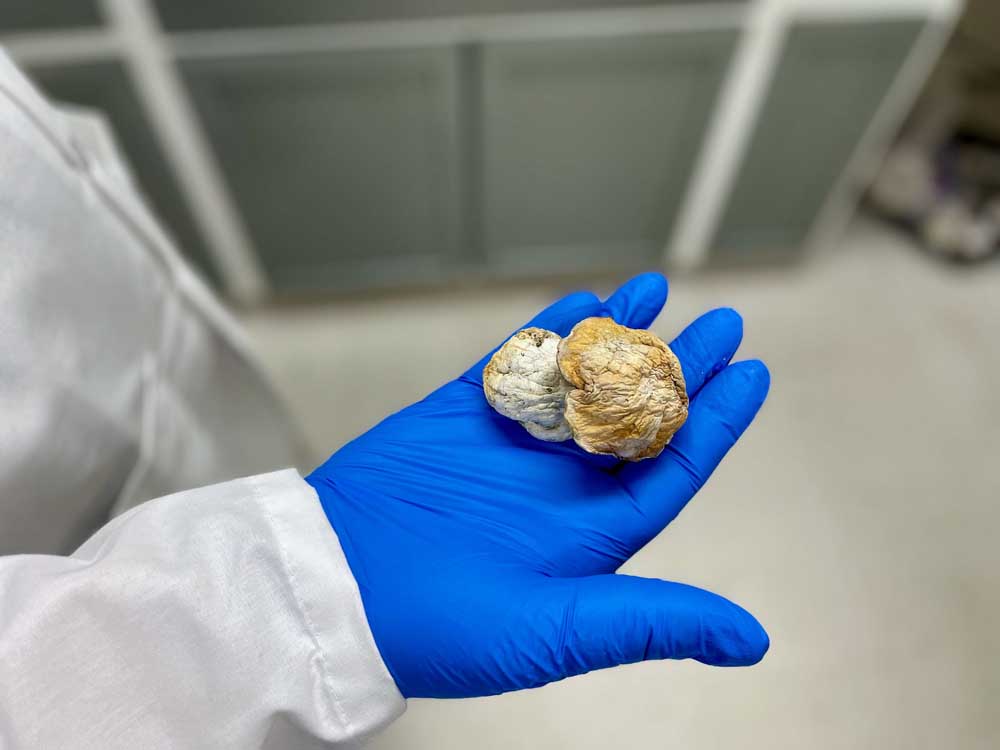Court upholds DEA denial of Seattle doctor’s request to use psilocybin to treat terminal patients
Published 9:01 pm Sunday, February 16, 2025

- Chemist Bjorn Fritzsche holds a psilocybin mushroom at Rose City Laboratories in Portland.
A federal appellate court has upheld the Drug Enforcement Administration’s denial of a Seattle doctor’s request to use psilocybin, the active ingredient in magic mushrooms, to treat terminally ill cancer patients.
Dr. Sunil Aggarwal, co-director of the Advanced Integrative Medical Science Institute, had sought approval from the DEA to provide psilocybin to his patients with late-stage and terminal cancer in accordance with federal and state right-to-try laws.
Since 2021, he’s sought access to the hallucinogen, a Schedule I controlled substance, to treat his patients for anxiety and depression but he’s been unable to find a supplier willing to provide him with psilocybin, according to the opinion.
The institute asked the DEA to determine that Aggarwal’s proposed use of the drug wasn’t subject to registration requirements under the Controlled Substances Act or to grant a waiver of those registration requirements. The DEA declined to take either action, and the institute appealed.
The 9th U.S. Circuit Court of Appeals upheld the DEA’s denial, finding the federal agency provided a “reasonable explanation” for its decision.
The DEA had concluded that the doctor was required to register under the Controlled Substances Act before providing psilocybin to his patients and rejected the institute’s argument that right-to-try laws waived the registration requirement.
The federal Right to Try Act allows access to “investigational drugs” for eligible patients who lack the time to wait for federal approval. It exempts those drugs from certain regulatory provisions, such as approval of clinical trials. But it doesn’t exempt drugs under the Controlled Substances Act.
The DEA’s decision “was neither arbitrary nor capricious,” a three-judge panel ruled Thursday.
Practitioners who seek to dispense or possess Schedule I controlled substances must be properly registered as an approved researcher, the appellate court ruled.
The institute didn’t demonstrate how its proposed use of psilocybin was “consistent with public health and safety,” beyond saying it has shown “enormous promise in early clinical trials” in relieving anxiety and depression suffered by the terminally ill, the opinion said.
The institute didn’t describe a treatment plan that the doctor envisioned or safety controls he’d adopt and offered no further information regarding the efficacy of psilocybin and none regarding its safety, the ruling said.
The state of Oregon joined with Washington, Delaware, Illinois, Michigan, Minnesota, Nevada, Pennsylvania and the District of Columbia in filing a friend of the court brief in support of the Seattle doctor and institute.
The states argued they have an interest in avoiding “undue federal regulation of the practice of medicine” and in upholding the rights of patients with life-threatening illnesses to make medical decisions with their doctors, according to their brief.
Oregon, in a law passed by voters in 2020, allows people to use mushrooms in state-licensed psilocybin service centers.
Circuit Judge Marsha S. Berzon wrote the opinion for the three-judge panel. The other two judges were Daniel A. Bress and Lawrence VanDyke.





